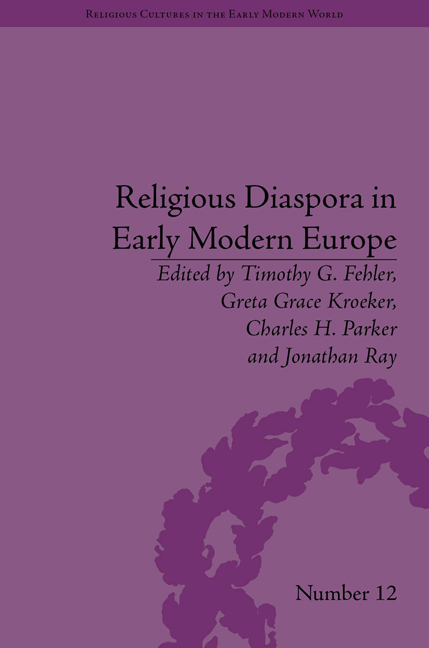Book contents
- Frontmatter
- CONTENTS
- Acknowledgements
- List of Contributors
- List of Figures
- Introduction
- Part I Tactics for Inclusion
- 1 Trade in Tolerance: The Portuguese New Christians of Antwerp, 1530–50
- 2 Swimming against the Tide: The Entry of Jews in Spain. Religious Mobility, Social Control and Integration at the End of the Ancien Régime
- 3 Populating a ‘Nest of Pirates, Murtherers, etc.’: Tuscan Immigration Policy and Ragion di Stato in the Free Port of Livorno
- Part II Programmes of Restoration
- Part III Methods of Coping
- Notes
- Index
1 - Trade in Tolerance: The Portuguese New Christians of Antwerp, 1530–50
from Part I - Tactics for Inclusion
- Frontmatter
- CONTENTS
- Acknowledgements
- List of Contributors
- List of Figures
- Introduction
- Part I Tactics for Inclusion
- 1 Trade in Tolerance: The Portuguese New Christians of Antwerp, 1530–50
- 2 Swimming against the Tide: The Entry of Jews in Spain. Religious Mobility, Social Control and Integration at the End of the Ancien Régime
- 3 Populating a ‘Nest of Pirates, Murtherers, etc.’: Tuscan Immigration Policy and Ragion di Stato in the Free Port of Livorno
- Part II Programmes of Restoration
- Part III Methods of Coping
- Notes
- Index
Summary
Located on the river Scheldt in the southern Low Countries, Antwerp of the sixteenth century was a vibrant and lucrative mercantile centre. Its commercial importance attracted merchants from all corners of the early modern world, including a large community of Portuguese New Christians, who used the port city as a midpoint in the transport of expensive spices from the Portuguese Indies to the Ottoman Empire. The New Christians seem to have been well integrated into both the civic and religious life of Antwerp. The extant documentation of the period suggests that they participated regularly in Antwerp's frequent religious processions and were among the more generous donors to the city's Christian charitable institutions. It would appear that the Portuguese needed to exercise few explicit ‘tactics of inclusion’ in order to be accepted into sixteenth-century society. The city welcomed them, surely in large part for their financial contributions to the common weal, and they repaid their hosts in kind, by serving as model citizens and generous civic contributors. Their integration into the community was threatened, however, in the 1530s, when accusations emerged that some of the Portuguese New Christians were actually ‘crypto-Jews’, who lived ostensibly Christian lives but practised Judaism secretly and encouraged others to do the same. These accusations set in motion a lively string of negotiations between the New Christians themselves, Emperor Charles V, his queen regent, Mary of Hungary, and the city council of Antwerp.
- Type
- Chapter
- Information
- Religious Diaspora in Early Modern EuropeStrategies of Exile, pp. 9 - 18Publisher: Pickering & ChattoFirst published in: 2014

